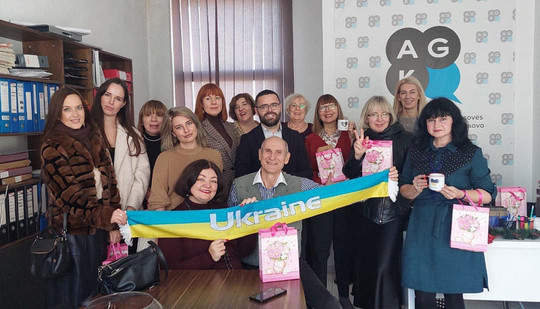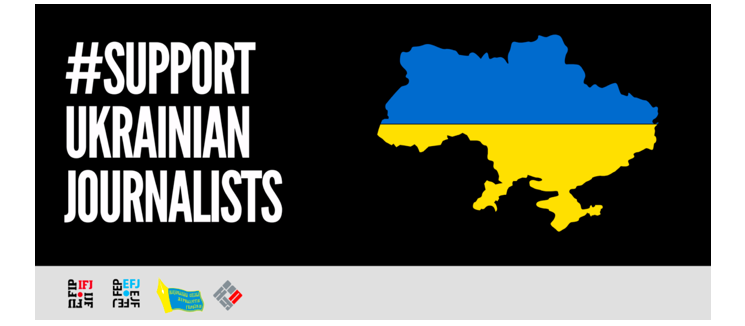Ukraine: “In Kosovo, we have also experienced the difficulty of becoming a refugee”

On 24 February 2023, it will be one year since Russia invaded Ukraine. The International and European Federations of Journalists (IFJ/EFJ) are launching a new fundraising campaign to support Ukrainian journalists on the ground.
On this occasion, the International Federation of Journalists interviewed Xhemajl Rexha, president of the Association of Journalists of Kosovo (AJK), about the work carried through their program “Journalists in Residence – Kosovo” with the Government of Kosovo and the European Centre for Press and Media Freedom (ECMPF) in collaboration with the European Federation of Journalists (EFJ), as they are welcoming Ukrainian journalists by providing them with assistance. He talks about the program, the challenges Ukrainian journalists face and union solidarity in times of crisis and war.
Can you describe the program “Journalists in Residence in Kosovo” ?
“Journalists in Residence – Kosovo” is a program initiated by ECMPF, based in Leipzig (Germany), financed by the Kosovo Government and implemented by the Association of Journalists of Kosovo. It is designed to host 20 Ukrainian journalists who had been forced from their country after Russia’s invasion. Since the arrival of the first journalist, Liudymyla Makey in April 2022, 13 journalists have benefited from the program, and 12 of them are now living and working in Kosovo.
Thanks to the support of the Kosovo Government, the journalists taking part in the program get a monthly allowance, social insurance, and do not have to pay rent. They also get monthly food and hygiene packages, and are offered Albanian and English language courses. The main goal of the project is for these journalists to be able to remain in their field of work, in a safe environment.
What were the actions the Association of Journalists of Kosovo put in place to welcome and provide assistance to Ukrainian journalists?
After they apply to the program, and are chosen by ECPMF, who also vets them in close coordination with Kosovo security institutions, AJK goes flat hunting to provide them with a comfortable accommodation close to our offices and the city centre. We picked them up at the airport together with ECMPF and Ministry of Interior officials. After they get registered, they are sent to their respective apartments, and some welcome mini-parties are organised the next day. We offer them working space at our offices, and help them arrange interviews or visits. We accompany them to open bank accounts and then get their Temporary Residence Permits with the Kosovo Government. Our project coordinator attends to their needs, basically 24 hours a day, in the sense they call him for anything, from fixing their TV cable to exploring their neighbourhood. We have successfully managed to integrate them, by going together to music, sports and other events they are interested in. We also organised trips within Kosovo, and also regional states such as North Macedonia and Albania.
What are the challenges Ukrainian journalists face when coming to Kosovo?
For most of them, Kosovo is a totally new place, a new country and it takes some time for them to get used to it. Most of them don’t speak any English, and luckily we have been engaging with two Ukrainian women who have lived in Kosovo for more than 10 years, and are crucial part of the program with their work of translation. As one might imagine, -or for us in Kosovo, as we have lived it ourselves-, it is very difficult to become a refugee, being far from your home and your relatives. We have tried to help them every step of the way, and they are engaged in psychological sessions with Kosova Rehabilitation Center for Torture Victims, an NGO based in the capital, Prishtina.
How would you describe journalists’ solidarity towards Ukrainian journalists in your country?
Ukrainian journalists have seen a huge welcome not only from the journalistic community, but from everyone in Kosovo. The public broadcaster, RTK and other private media have offered them working spaces. They have met at least 4 times with Kosovo Prime Minister, Albin Kurti, most recently on the occasion of Orthodox Christmas in January. On the occasion of Ukraine Independence Day, they were hosted by Kosovo President Vjosa Osmani, and on other occasions met with Organization for Security and Co-operation in Europe (OSCE), National Democratic Institute (NDI) heads, and also German, US and UK Ambassadors. Most of the Ukrainian journalists in Kosovo are celebrities, as they give interviews to local media all the time, and that is why as Liudymyla Makey explains : “people stop us in the streets, want to buy us coffee and say ‘Slava Ukraini’”.
What advice would you give to other unions that are willing to help?
What is happening in Ukraine right now, took place in Kosovo some 24 years ago. Our staff at AJK have all been refugees as kids, and made to move out of our country. We can totally sympathise with our colleagues, and are engaged in this project wholeheartedly. But, in the end, for all unions applies the need of solidarity for our colleagues of the profession, and their important, crucial work they do wherever they are based.
Please donate to the IFJ/EFJ Safety Fund for Journalists in Ukraine to support Ukrainian journalists in need.







